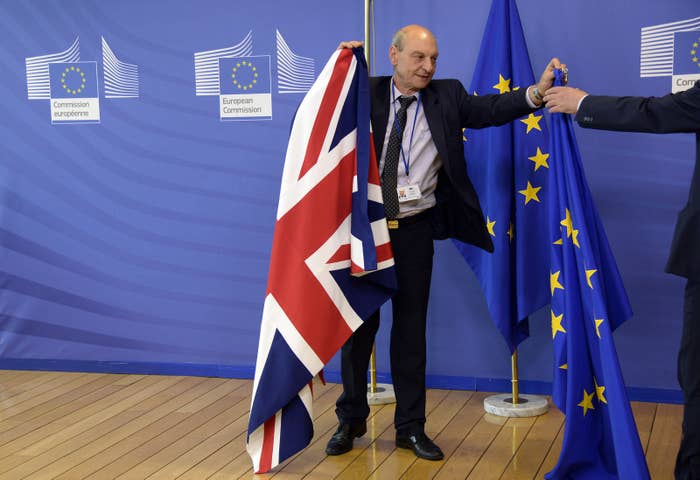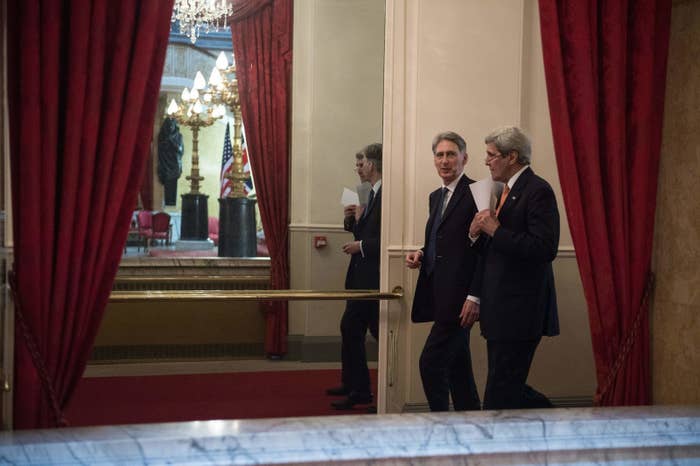
British diplomats are worried the sun may finally be setting on their nation’s outsize role on the international stage after the country voted to leave the European Union last week.
With its storied imperial history and permanent veto-wielding seat on the United Nations Security Council, the United Kingdom has always punched above its weight diplomatically, more like a Russia or China than a long-faded world power like Portugal or Holland.
But the vote on Thursday not only marked the potential departure of the U.K. from the 28-nation bloc, it also signaled the emergence of a myopic, inward-looking era for a country long considered among the most influential in global affairs. British diplomats deployed around the world said they were stunned by the outcome of the referendum.
“Not surprisingly all of us are gutted and shocked and can't really believe it,” one senior diplomat serving in an Arab capital told BuzzFeed News. “We are by definition internationalists. You want to play a major role in everything. And we got used to doing this through the EU over the last 40 years.”
Another British diplomat who was formerly posted in the Middle East added: "Let's be honest: [the EU referendum result] is not a positive for our international standing.”
The two diplomats and others spoke to BuzzFeed News on condition of anonymity. The Foreign and Commonwealth Office in London has ordered diplomats to stay off social media and not comment about the referendum results. “The party line is that we have to be seen as impartial,” the diplomat in the Arab capital said. “The people have spoken. And it's our job to get the best deal possible.”
One current British diplomat said EU counterparts were commiserating with their U.K. colleagues, describing their reaction to the vote result as: “Jesus, you're a bit fucked. But let's try and get through this."
The U.K.’s departure from the EU, which must still be upheld by the British parliament and could take more than two years to conclude, will decrease London’s sway within an important bloc of nations that has managed to remain mostly united and relatively effective during major events like negotiations to scale back Iran’s nuclear program, the Arab Spring uprisings, and Russia’s intervention in Ukraine. The EU’s effectiveness can most easily be seen in crises that don’t usually draw the attention of global powers, such as its efforts in 2010 to cajole warring parties to end the civil war in Ivory Coast.

"I think EU departure will mean we will lose influence in an important grouping,” said one U.K. diplomat who served in West Africa. “Their sanctions and unity in general during the Ivory Coast crisis, for example, [were] an important part of the diplomatic response and pressure.”
In or out of the EU, the U.K. will remain a world power, even if a diminished one. The U.K. has a relatively strong diplomatic corps, steeped in foreign languages, as well as a military that is ranked along with the U.S., Russia, China, and India as among the top five in the world. Unlike smaller EU nations, its diplomatic and military capacity isn't entirely dependent on EU membership. “We built these credentials long before the EU came about,” said the diplomat formerly based in the Middle East.
The British diplomat serving in the Arab world said departing from the EU could even make his job easier. “In some ways it will be liberating,” he said. “We wouldn’t have to agree on every issue with 27 other countries. We can come to our own conclusions and make statements."
Then there are the regular lengthy meetings with fellow EU diplomats based in the same country. "We rarely get much out of these meetings and you can go on for hours,” he said. “They often amount to the French and the U.K. ambassadors telling everyone else what has happened.”
Still, in places where other countries have linguistic and historical advantages, those same dull meetings could prove useful. In Latin America, Spaniards could provide special insights and access. In dealing with the Libya crisis, Italians take the lead. On Russia, Germany has long had privileged access to the Kremlin, which is denied to others.
“In French West Africa, where the U.K. does not have the same level of resources as, say, the French, it allows us to get more for our buck,” said the former diplomat based in West Africa. “I'll be honest, I was always a fan of the EU, including EU meetings … which are not always popular with U.K. diplomats. Like the Eurovision Song contest, we'll miss the EU if it’s taken away from us."


